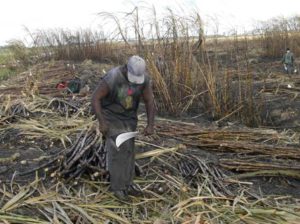
…miniaturising sugar: Guyana’s historically largest agricultural enterprise
Ironically, just over a week ago, as “Agriculture Month” was launched, the nation had to grapple with the fact that all a mother could do was cry when her children woke in the middle of the night asking for some food. We heard that she would give them a cup of water because that is all she can afford to do, but she is just one of thousands of persons so affected and the common cause – the closure of several sugar estates without a contingency plan.
When the A Partnership for National Unity/Alliance For Change (APNU-AFC) coalition came into power in 2015 after promising sugar workers better conditions, it established a multimillion-dollar Commission of Inquiry (CoI) into the state of the industry. The report of the CoI was presented to the Government only to be shelved along with several other reports.
In May of 2017, Agriculture Minister Noel Holder presented the White Paper on the future of the sugar industry and according to many, it was and still remains a gloomy future. The White Paper outlined a number of initiatives to “save the sugar industry” and among those initiatives was the closure of several estates over a period of time. However, the Government never rolled out a contingency plan to cushion the effects of the closures and the results have been borderline disastrous.

Last year, 1851 workers were sacked from the Skeldon Sugar Estate, 1181 from the Rose Hall Estate, 1480 from the East Demerara Sugar Estate and 251 from the Wales Sugar Estate in addition to the hundreds terminated in 2016. The closure of the four estates and the displacement of the workers have had catastrophic impacts on the entire country, since many of the redundant workers are yet to be gainfully employed and their loss of purchasing power cascades in the economy.
The Government has been conducting some training with the sugar workers, but that training is very limited and still does not guarantee them a source of steady income. Some of those workers have received their severance packages, but there are some still waiting and fighting to get what remains of theirs.
Many of the workers have taken up odd jobs, working as labourers in stores for salaries way below what they are accustomed to. They work as security guards and as is the case of several of them from the Wales Estates, they are battling for their salaries from Sentinel Security Service. These men and women have no other choice than to work in whatever fields they can gain employment, since many of them do not have high school certificates nor are they literate.
The reality of the lack of employment opportunities does not seem to be settling in with the officials since we often hear speeches about efforts to cushion the effect and provide more jobs, but see very little action.
The White Paper identified that the Guyana Sugar Corporation (GuySuCo) would offer the closed estates for sale while three estates would remain operational since that would be more feasible.
“The process will result in improving the relationship with some cane cutters, estate staff and about 1710 private cane farmers. These adjustments mean that GuySuCo would be scaled-down into a more efficient entity that focuses on producing sugar to satisfy the domestic and foreign markets that provide preferential access to our sugar. This entails taking advantage of the opportunity to merge better performing lands to operate factories more efficiently,” Minister Holder said during his presentation in Parliament last year.
To handle the sale of the estates, the Government created the Special Purpose Unit (SPU) which evaluated the viability of the closed estates and recommended that the estates remain operational in order to increase sale value. To accomplish this, the SPU negotiated a $30 billion bond facility with Republic Bank Limited.
But since the announcement of the bond, concerns have been raised about Government’s vision for the industry and the genuineness of its actions thus far, since that very $30 billion could have gone into restructuring the industry while keeping all of the estates open and GuySuCo’s workforce employed and engaged. The SPU is now in full control of the Wales, Skeldon, Rose Hall, and Enmore Estates.
Notwithstanding GuySuCo’s financial woes, some 14 companies hailing from as far as Canada and as near as Trinidad and Tobago and Guyana have expressed interest in purchasing the three sugar estates up for sale. A meeting with these investors and officials from the SPU was held on September 25, 2018. According to the Unit, they would have met with the executives to discuss taxes and permits, and the National Industrial and Commercial Investments Limited (NICIL) is expecting that they would be able to sell the Rose Hall, Skeldon and East Demerara Estates by next year.
The Unit is also accusing GuySuCo of misappropriating the monies released to it for the enhancement of its operations. The $30 billion syndicated bond with an interest rate of 4.75 per cent was intended to capitalise GuySuCo’s remaining estates. It subsequently emerged that part of the bond was used by GuySuCo to repay interest on another debt.
Despite this fiasco, GuySuCo claims it is well on its way towards achieving the modest targets set for second crop production. Yet, according to the Corporation, the Albion, Blairmont and Uitvlugt Estates have achieved or exceeded weekly production targets less than half of the weeks they were in operation. The target per estate for the second crop is as follows: Uitvlugt – 10,780, Albion – 38,160 and Blairmont – 19,105 tonnes of sugar.
As the sugar industry continues to deteriorate, the people continue to suffer. Wales and Berbice continue to grapple with the reality of the closures. Families there are very worried about where the next meal will come from and are living on measly earnings.
There are retrenched workers protesting for the remainder of their severance packages as promised. There are families that continue to worry about the next meal, about where the next dollar will come from, about what will happen if disaster strikes. There are businesses that have to lay off workers because the sugar workers are not spending as they used to. The demand for goods is low while the supply is high. There are farmers who suffer losses because their cash crops spoil all because people cannot afford to buy food.
(Sunday Times Magazine)



